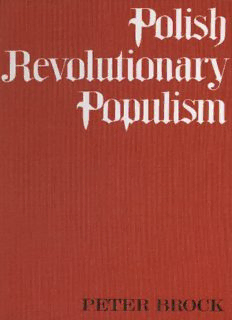
Polish Revolutionary Populism: A Study in Agrarian Socialist Thought from the 1820’s to the 1850’s PDF
Preview Polish Revolutionary Populism: A Study in Agrarian Socialist Thought from the 1820’s to the 1850’s
POLISH REVOLUTIONARY POPULISM: A STUDY IN AGRARIAN SOCIALIST THOUGHT FROM THE 1830s TO THE 1850s PETER BROCK is a member of the Department of History at the Univer- sity of Toronto. He is the author of The Slovak National Awakening, and co-editor, with H. Gordon Skilling, of The Czech Renascence of the Nineteenth Century. Polish populism, which advocated agrarian socialism by either revolu- tionary or reformist means, emerged first among the émigrés who had left Poland after the Russians defeated the nationalist uprising of 1830. In exile they came into contact with the ideas of French 'Utopian* social- ists such as Babeuf, Saint-Simon, Fourier, and Cabet, and they at- tempted to adapt these ideas to the very different conditions prevailing in their east European homeland. Thus this version of populism pre- ceded in time, and probably influenced, the emergence of the ideas of the better-known Russian narodniks. Polish Revolutionary Populism describes the activities and conflicting ideologies of the various organizations, abroad and in partitioned Po- land, which were struggling for national independence and for agrarian and social reform. Like the author's recent work, The Slovak National Awakening, this book deals with the emerging national aspirations char- acteristic of central and eastern Europe at the time and with the variety of political and social theories that made debate so acrimonious. This page intentionally left blank PETER BROCK Polish Revolutionary Populism: a study in agrarian socialist thought from the 1830s to the 1850s UNIVERSITY OF TORONTO PRESS Toronto and Buffalo © University of Toronto Press 1977 Toronto and Buffalo Printed in Canada Library of Congress Cataloging in Publication Data Brock, Peter, 1920- Polish revolutionary populism. Bibliography: p. Includes index. 1. Populism-Poland-History. 2. Socialism in Poland-History, i. Title. HX315.7.A6B76 335'.009438 77-2840 ISBN 0-8020-5374-2 This book has been written by a member of the Centre for Russian and East European Studies, University of Toronto. A list of other books sponsored by the Centre appears at the back of the book. This book has been published during the Sesquicentennial year of the University of Toronto Contents PREFACE VÍÍ Prologue 3 1 The birth of revolutionary populism 5 2 Polish narodniks in exile 25 3 Polish narodniks at home 44 Epilogue 87 NOTES 91 SELECT BIBLIOGRAPHY 115 INDEX 121 This page intentionally left blank Preface The first - the Polish - phase in the history of East European populism is virtually unknown in the West, whereas the next period, which saw the emergence of Russian revolutionary populism, is familiar to many readers, largely through the massive work of the Italian historian Franco Venturi, which is accessible in English translation. Although a very thorough study of early Polish agrarian socialism has been published in London by Lidia and Adam Ciolkosz, the fact that it appeared in Polish has prevented it from gaining the attention of non-Polish historians. Since 1945, scholars in the new Poland have shown great interest in the subject too. Yet for understandable reasons they have usually skirted round the fact that it was the Poles, and not the Russians, who were the innovators in this development. And Soviet historians have normally done likewise. Beginning as far back as 1953 I have published a number of articles devoted to Polish revolutionary populism in the period between the in- surrections of 1830 and 1863. In the present book, which has been com- posed with the non-specialist reader in mind, I have attempted to give a connected account of the whole movement. Throughout I have used the Russian term for a populist (narodnik), which first appears in Russia only towards the end of the 1870s, to desig- nate his Polish predecessor also. I have done so in order to bring out the many similarities in outlook between them. And my use of an anglicized plural in this case is also justified, I think. (At least if it is not, why then sputniks and beatniks?) Finally, I am grateful to the respective editors for permission to draw on the following articles of mine: 'The contribution of Leon Rzewuski to the socialist movement in 1848,' Annali of the Istituto Giangiacomo Pel- viii Preface trinelli (Milan) 3 (1960); The Polish "Movement to the People": an early chapter in the history of East European Populism/ Slavonic and East European Review (London) 40, no. 94 (Dec. 1961); 'Socialism and nationalism in Poland, 1840-1846,' Canadian Slavonic Papers (Toronto) 4 (1960); and to Macmillan & Co. Ltd for such permission in regard to my study 'The socialists of the Polish "Great Emigration," ' in Asa Briggs and John Saville, eds, Essays in Labour History: In Memory of G.D.H. Cole (London 1960; new edn, 1967). I would like to thank the Centre for Russian and East European Studies (University of Toronto) for providing funds for typing the manuscript of this book, and Larry MacDonald, my editor, who once again provided valuable asistance at various stages in its production. The book has been published with the assistance of a grant from the Social Science Research Council of Cana- da, using funds provided by the Canada Council, and a grant from the Publications Fund of University of Toronto Press. PdeBB POLISH REVOLUTIONARY POPULISM: ASTUDY IN AGRARIAN SOCIALIST THOUGHT FROM THE 1830s TO THE 1850s
Description: